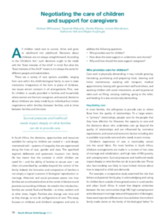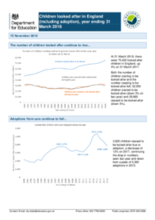Displaying 211 - 220 of 623
This study provides an analysis of the ‘investigative turn’ in England by comparing two large cohorts of children, one whose fifth birthday was in 2011–12 and the other in 2016–17.
This article investigates the colonialist definitions of the terms “orphan” and “adoption”, contrasting them with how the traditional practice of child circulation in Fiji cared for orphaned children.
In this video, Dr. Kristen Cheney discusses how her work led her to study the growth of the Orphan Industrial Complex and its adverse effects on children, families, communities, and child protection systems.
This chapter from the South African Child Gauge 2018 focuses on childcare and children’s caregivers in South Africa and aims to address the following questions: Who provides care for children? How does the state support or undermine care choices? Why and how should the state support caregivers?
This statistics publication from the UK Department for Education provides information about looked after children in England for the year ending 31 March 2018.
This paper presents findings on the previous life experiences of an entire cohort of ‘difficult to place’ adoptees who were placed in Australia over 26 years.
This is an exploratory study focused on open adoptions from foster care conducted through the public child protection agency in New South Wales, Australia.
The aim of this study was to investigate whether the risk of depression in adulthood in children raised by substitute parents from an early age differ by care arrangements.
This brief from the National Child Protection Working Group (NCPWG) examines the types of corrupt practices experienced by children in Uganda and what can be done to close the loop holes that allow such corrupt practices. The brief highlights the impacts of corruption on children's wellbeing including "instances of falsifying birth histories of children to qualify for orphan status and consequently eligibility for international adoption."
These updated UN High Commissioner for Refugees (UNHCR) Guidelines provide guidance on determining the best interests of the child in decisions affecting children at risk, in particular children who are separated from their parents and families.





